Specialty Feeders Including Nyjer & Peanut Feeders
Nyjer Feeders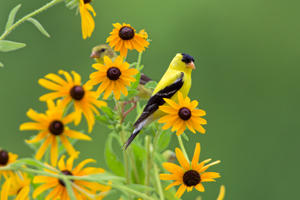
Nyjer is a tiny black seed grown in Ethiopia and India and adored by goldfinches and pine siskins for its high fat and protein content. It is often (incorrectly) referred to as "thistle seed". There is no relation between nyjer seed and the wild native thistle plants found here - the confusion may have arisen from the fact that goldfinches do eat the small seeds of the native plants and use the down from its flowers for nesting material. Because nyjer seed is an imported seed, it is heat sterilized before it enters North America. This treatment kills any weed seeds that may have been packaged accidently with the nyjer and prevents the spread of any invasive plants. This also means that the nyjer seed has a very short shelf life - nyjer can go stale in as little as 4-6 weeks during the summer. For this reason, it is important to only buy as much nyjer as your birds will eat in that period of time.
Due to the small size of the seed, nyjer requires special feeders. Feeders with either small holes or small mesh are required to prevent the seed from spilling on the ground as would happen with feeders with larger ports. Nyjer is also an expensive seed so you don't want to waste money as well as seed.
Nyjer feeders are available in a variety of sizes. Most of the nyjer feeders now come in a bright yellow colour that mimics the colour of the male birds - studies have shown that goldfinches like the yellow and are more attracted to these feeders, although no one really knows why.
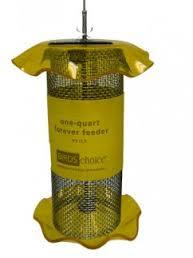
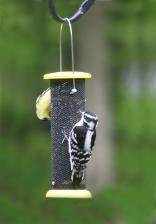
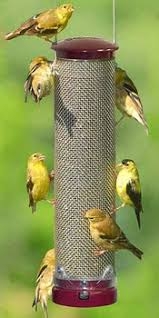
Mesh feeders are great for people with lots of goldfinches. The mesh tube allows the birds to cling all over the feeder, unlike tubes with perches that only allow a few to feed at a time.
Nyjer tube feeders come in a variety of sizes: we recommend feeders that offer the "easy clean" style where the bottom is quickly removed to make cleaning easy.We still carry other, smaller tube feeders that do not offer the quick-clean option. The advantage to the tube feeders is that the seed is better protected against wet weather, definitely desirable when you feeding finches in the fall or winter.
Although nyjer seed is commonly fed to goldfinches and pine siskins, other birds can develop a taste for this small seed. Unfortunately, sometimes birds like blackbirds like it a little too much. To prevent them from devouring your seed, try a Squirrel Buster Finch Feeder or a caged feeder.
If space is an issue, you can also use "thistle sacks" to feed nyjer. These small mesh nylon bags are perfect for feeding goldfinches in an inexpensive way.
Everyone Loves Peanuts!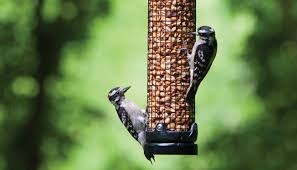
Peanuts are a favourite food for a lot of birds, not just squirrels and jays! Large, soft skinless peanuts are loved by that chickadees, woodpeckers and bushtits. They can be fed in a wire mesh tube feeder that the will birds cling to and peck at the nuts. It sometimes can take a little time for the birds to understand how good these are, but once they do, it will become a busy feeder.
Squirrels and jays like whole or "peanut pick outs" best (peanut pick outs are shelled, processed peanuts that aren't good enough for peanut butter).
Or if you want to offer a more varied diet, feed our Gourmet Squirrel & Jay mix with striped sunflower, black oil, whole peanuts and red peanuts.
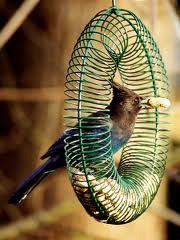
There are also feeders that can be used for whole peanuts. Jays love pulling out the peanuts from these feeders, although sometimes too quickly! If you would like your jays to work at the peanuts a little longer than 15 minutes, try the Wreath 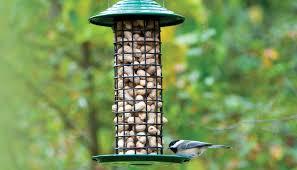 Peanut feeder. A slinky-type wreath is filled with whole peanuts, making your bossy birds work for their supper! Squirrels love these feeders too although hanging it off a baffled pole usually deters them.
Peanut feeder. A slinky-type wreath is filled with whole peanuts, making your bossy birds work for their supper! Squirrels love these feeders too although hanging it off a baffled pole usually deters them.
Specialty Feeders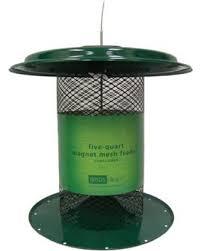
There are times that you would like to feed either only one type of bird or a certain seed. Maybe you have only chickadees and prefer feeding black oil sunflower, or you want to make your jays happy by offering them a large, easy to access feeder. On the other hand, you might want to limit access by the larger birds to give your smaller songbirds a chance. This is where specialty feeders come in.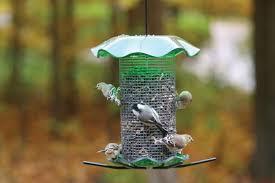
Black oil sunflower feeders have a mesh tube that allows birds to pull the seeds out. You can get them in different sizes in either metal or plastic. These feeders work best when used with a small, premium black oil as a larger seed will get stuck in the mesh and jam the feeder. Birds that like black oil feeders are traditionally chickadees, grosbeaks, nuthatches, finches and pine siskins.
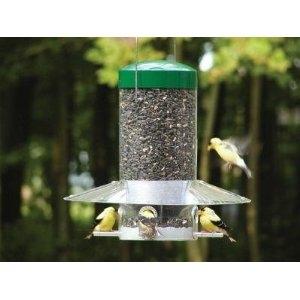
We are always looking for feeders that will keep either the rain off or the squirrels out. And when we find one that does both, it gets our highest recommendation. The Classic feeder by Birds Choice holds 1.2 gallons of seed with 6 feeding stations. But what makes this feeder so great for our coastal weather is the movable plastic baffle. This baffle can be moved down to limit access to only small birds and shield the ports (and seed) from the rain. We have used this feeder in our own yard for several years and found that it does a remarkable job of keeping the sunflower chips dry.
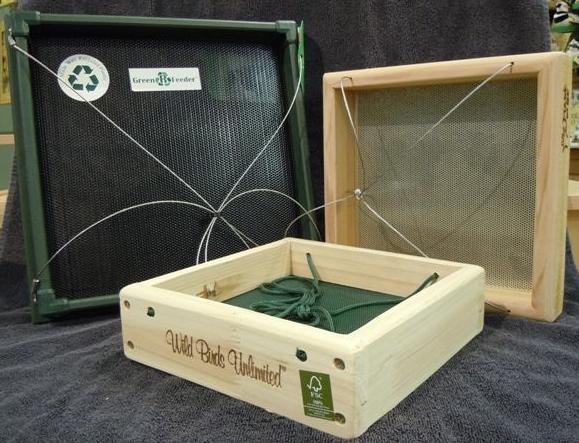
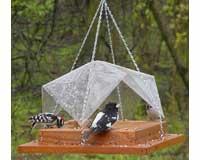 Platform feeders and hanging trays are great for larger birds who usually find that the perches on feeders are just too small for them. These feeders are made from either recycled plastic or wood with a perforated aluminum mesh bottom to allow moisture to drain away. Platform feeders can be mounted on top of a metal or wood pole. The only complaint about these feeders is you need to fill them daily -- especially if you have jays or squirrels! And if you are worried about rain, you can purchase a removable plastic cover (comes in 12x12 and 9x9 sizes) to go over your trays.
Platform feeders and hanging trays are great for larger birds who usually find that the perches on feeders are just too small for them. These feeders are made from either recycled plastic or wood with a perforated aluminum mesh bottom to allow moisture to drain away. Platform feeders can be mounted on top of a metal or wood pole. The only complaint about these feeders is you need to fill them daily -- especially if you have jays or squirrels! And if you are worried about rain, you can purchase a removable plastic cover (comes in 12x12 and 9x9 sizes) to go over your trays.

Window feeders are a wonderful way to feed birds for people who are either in apartments or unable to get outside. Held to the window by suction cups, they don't hold a lot of seed but they do give you an intimate experience with your favourite feathered friends.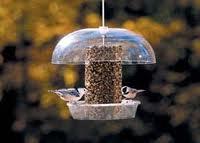
We like feeders that come with domes, our wet climate means feeders without domes become a very wet mess in no time. One of the best is the Dinner Bell. The adjustable dome can be used to either keep rain off the seed or to deter large birds. This versatile feeder can be used for seed, cylinders, stackables, or mealworms.
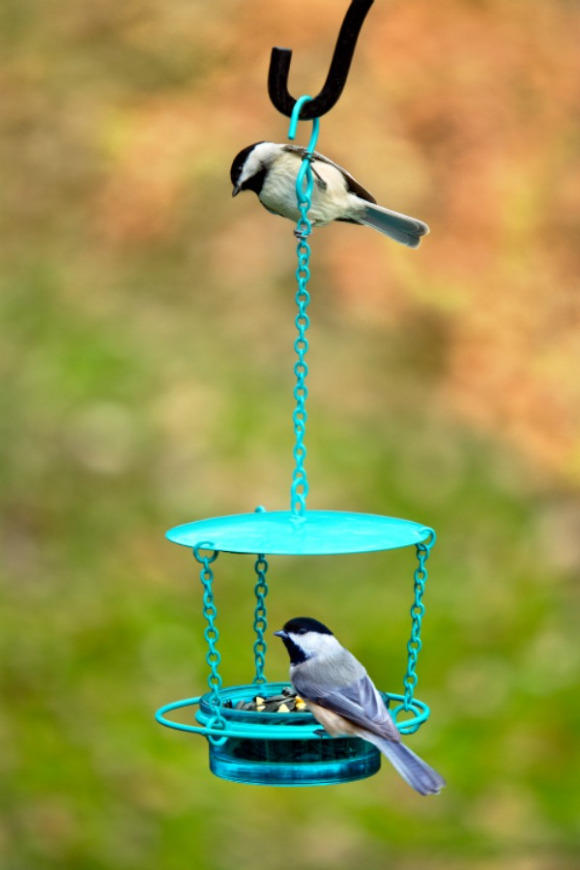
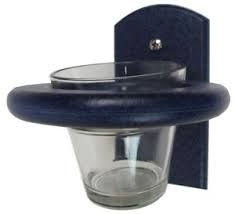 Mealworms are a good source of protein, important for nesting, molting or baby birds. Now available in a dried form, it is easy to offer mealworms all year long. Simply mix them in with your dried seed or use them in any of our new mealworm feeders. We have found that our chickadees, towhees, song sparrows as well as woodpeckers really love these little critters!
Mealworms are a good source of protein, important for nesting, molting or baby birds. Now available in a dried form, it is easy to offer mealworms all year long. Simply mix them in with your dried seed or use them in any of our new mealworm feeders. We have found that our chickadees, towhees, song sparrows as well as woodpeckers really love these little critters!
Another specialty feeder that birds will love is this plexi-glass roof hung over a large recycled tray. The roof can 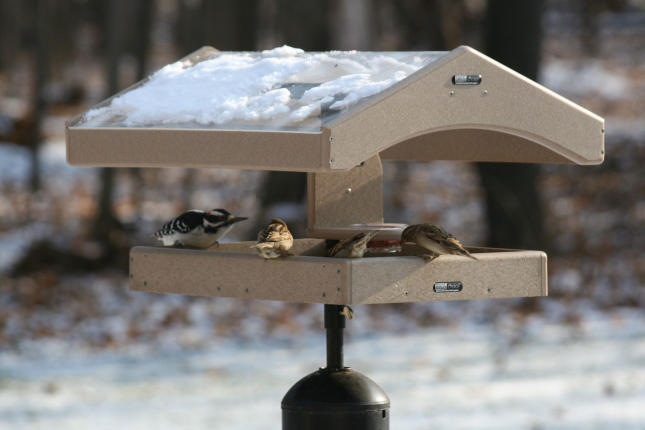 be raised or lowered depending on the weather and the perforated aluminum removable trays allow moisture to drain away from the seed. Use a WBU APS Pole System to hang it in your yard and watch the birds come!
be raised or lowered depending on the weather and the perforated aluminum removable trays allow moisture to drain away from the seed. Use a WBU APS Pole System to hang it in your yard and watch the birds come!
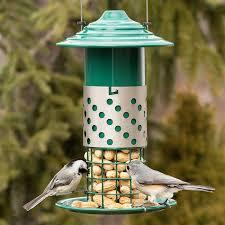
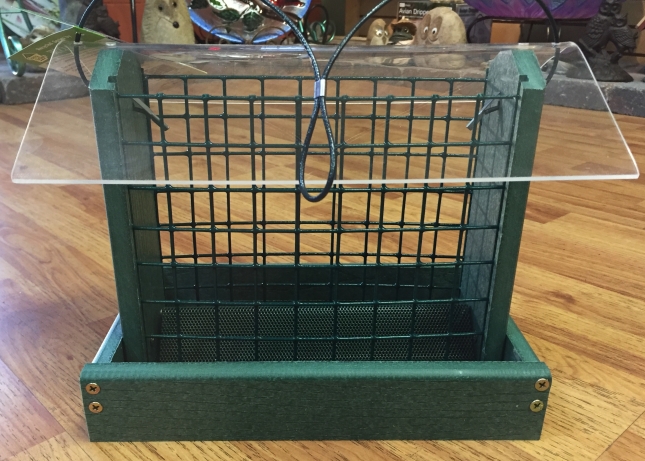 Other specialty feeders that are popular are ones that are dual purpose; you can use them to feed two different types of seed. The one on the right can feed either whole peanuts or mealworms and the one on the left can feed either whole peanuts or large suet or seed blocks.
Other specialty feeders that are popular are ones that are dual purpose; you can use them to feed two different types of seed. The one on the right can feed either whole peanuts or mealworms and the one on the left can feed either whole peanuts or large suet or seed blocks.

Some birds, like towhees and sparrows, are happiest when on the ground. Although almost any type of feeder will work for these birds, make sure that it is not sitting in wet patches.That is why a raised ground feeder works best. You can either purchase a basic ground feeder (like the one those house finches are enjoying) or have a recycled feeder with an attached roof-- great for the weather. When using a ground feeder, it is important to keep it well away from bushes as to make it more difficult for cats to attack. If you are having trouble with squirrels or rats eating all your seed, you can use a ground cage cover to keep them out.

